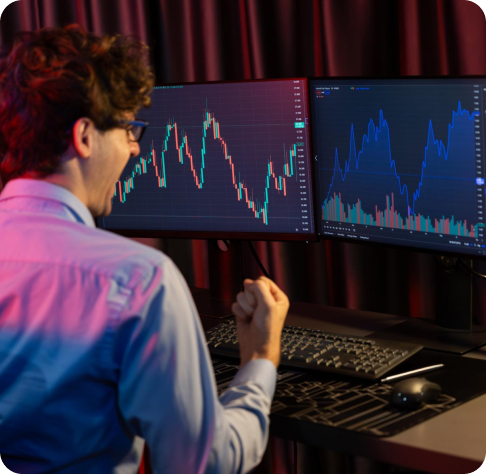


Some crypto-specific proprietary trading firms offer starting equity of up to $200,000, with traders able to pocket up to 90% of profits generated
The depth of a prop firm’s trading terminal can make or break the efficiency of a trader’s strategies
Rules imposed by prop trading firms may be as simple as setting stop-loss orders or diversifying portfolio allocation
Choosing the right crypto prop trading firm is an essential decision that can significantly impact a trader’s career. In this comprehensive article, we aim to guide you through this critical investor’s dilemma, elaborating on the nuances and intricacies of the process.
Proprietary trading, more commonly known as prop trading, is a practice where a brokerage or proprietary trading firm allocates its own capital to traders. This arrangement enables traders to employ various strategies using the firm’s funds while retaining a substantial portion of the profits, often up to 90%.
In recent years, proprietary trading has emerged as an increasingly popular and lucrative option, particularly in the dynamic cryptocurrency market. The rise of crypto-specific prop trading firms is a testament to the growing interest among traders in leveraging these unique opportunities. These firms offer a gateway for traders to immerse themselves in the market without the need to risk their own capital.
But what exactly are the benefits of engaging with a crypto prop trading firm? And what are the potential pitfalls one might encounter? It’s crucial to weigh these factors carefully to make an informed decision.

On one hand, crypto prop trading firms present a distinct advantage for traders looking to tap into the market’s potential without the financial burden of providing their own funds. This can be particularly appealing for emerging traders or those who prefer not to tie up their own capital in speculative investments.
However, it’s also important to understand the complexities and risks associated with crypto prop trading. Such trading strategies require a deep understanding of market dynamics and the ability to swiftly navigate through the volatile cryptocurrency markets.
Ultimately, while crypto proprietary trading is open to a broad spectrum of traders, it may not necessarily align with the objectives or risk tolerance of every individual. To fully comprehend the pros and cons of this approach, let’s delve deeper into the specifics of crypto prop trading, examining the opportunities it presents and the challenges it poses.
Selecting the appropriate crypto prop trading firm is a pivotal decision that can profoundly influence a trader’s professional trajectory. In this detailed article, we discuss this crucial choice faced by investors, shedding light on the complexities and subtleties involved.
Proprietary trading, often referred to as prop trading, is a system in which a brokerage or a proprietary trading firm utilizes its own funds to empower traders. This model permits traders to apply diverse trading strategies with the firm’s resources, offering them the chance to keep a significant portion of the profits.

In the fast-paced and evolving cryptocurrency market, prop trading has gained increasing popularity and profitability. The emergence of crypto-centric prop trading firms underscores the growing enthusiasm among traders to capitalize on these distinct opportunities. These establishments provide an avenue for traders to engage in market dynamics without the risk associated with investing their own funds.
Exploring the advantages and potential challenges associated with partnering with a crypto prop trading firm is essential for an informed decision-making process.

Crypto prop trading firms offer considerable benefits, especially for those seeking to explore the market’s possibilities without the financial risks of using personal capital. This aspect is especially attractive to new traders or those cautious about investing their own money in speculative ventures.
However, the complexities and inherent risks of crypto prop trading should not be underestimated. Success in this field demands an in-depth understanding of market trends and the agility to navigate the unpredictable nature of the cryptocurrency markets.
Crypto prop trading is accessible to a diverse array of traders, but it’s important to acknowledge that it may not be aligned with everyone’s trading objectives or risk appetite. A thorough exploration of the pros and cons of crypto prop trading is imperative. We will explore these aspects, discussing both the opportunities and challenges presented, to provide a comprehensive overview of what it entails to engage with a crypto prop trading firm.
A key advantage of aligning with a crypto proprietary trading firm lies in the significant access to trading capital, vastly surpassing the resources typically available to individual traders. This benefit is especially relevant in the cryptocurrency trading sector, where the potential for market opportunities is immense but often necessitates considerable financial backing to fully capitalize on.

Traders who have refined their strategies and demonstrated a successful trading history but are hindered by limited personal resources, can greatly benefit from a partnership with a prop trading firm. These firms provide the essential financial instruments and firm’s capital, enabling traders to scale their strategies, thereby potentially increasing their profits. For both seasoned and emerging traders in the financial markets, prop trading offers a unique opportunity to operate on a level that might otherwise be unattainable.
For those new to the financial industry or crypto trading, working with a crypto-specific prop firm offers a distinctive entry point. Such firms provide a supportive environment for exploring various trading styles, from high frequency trading to global macro trading, all while mitigating the risk of using personal funds. The substantial starting equity, which in some cases may reach up to $200,000, offers a solid foundation for new traders to commence their trading journeys.
In addition, partnering with a proprietary trading firm grants traders access to state-of-the-art trading platforms and advanced analytical tools. This technological advantage, coupled with the firm’s resources, empowers both novice and experienced traders to effectively navigate the complex financial markets. It’s important to note that proprietary trading firms differ in their technology offerings, with some providing cutting-edge algorithmic trading systems and a diverse range of custom indicators that bolster a trader’s capability to spot market opportunities.

This symbiotic relationship benefits not just the traders but also the prop firms. By engaging a varied pool of traders, proficient in everything from technical analysis to speculative investments, prop firms can diversify their trading activities and better manage risks across different financial instruments and markets.

The benefits of partnering with a crypto prop firm are multifaceted, offering significant starting equity, access to a wide range of financial markets, sophisticated trading tools, and the opportunity for traders at all levels to apply their strategies on a grander scale. This cooperative model between traders and prop firms creates a synergy that can lead to improved trading outcomes and potentially higher profits for all involved parties.
Top-tier prop trading firms provide their traders with a wide array of cryptocurrencies, presenting a valuable chance for conventional investors to diversify their portfolios. Including this fast-growing asset class, which has seen significant profitability recently, allows traders to expand and enhance their investment approaches. The range of cryptocurrencies offered by these firms includes both well-established and emerging digital currencies, enabling traders to adapt their strategies to various market scenarios and trading methods.
One notable benefit offered by many prop trading firms, including those in the crypto space, is the chance to explore advanced prop trading strategies in a simulated trading environment. Leading crypto prop firms equip their traders with advanced trading terminals, designed to parallel the standards of central exchanges. These platforms offer traders a seamless entry into the crypto market, with access to a wide array of high-volume digital currencies. The functionality and user-friendliness of these terminals are crucial; they provide essential tools and custom indicators necessary for effective decision-making and strategy implementation.
Additionally, top crypto prop firms ensure access to liquidity from Tier-1 centralized cryptocurrency exchanges, allowing their prop traders to utilize a full range of trading options similar to those available on the exchanges themselves. This includes options for leveraged trades, perpetual futures contracts, and more. Access to real-time market data and liquidity is essential for traders to optimize their trading strategies.

It’s critical to understand that not every proprietary trading firm offers equal access to Tier-1 exchange liquidity or equivalent quality in their trading terminals. The depth and sophistication of a prop firm’s trading terminal are key factors that influence a trader’s success. Traders need to thoroughly assess the resources and tools provided by different prop firms to ensure alignment with their trading objectives and requirements.
One of the most appealing aspects of being a crypto prop trader is the opportunity to trade with the firm’s capital, substantially reducing the financial risks typically associated with crypto trading. Trading with a prop firm’s capital, while carrying responsibilities akin to using one’s own funds, notably decreases personal financial exposure, making it an attractive proposition for both novice and seasoned traders.

However, it’s imperative to recognize that trading with a prop firm’s capital comes with its own set of safeguards and constraints. Proprietary trading firms typically implement daily loss limits and other risk management measures to safeguard their investments. These protocols are designed to ensure traders maintain disciplined trading practices and refrain from excessive risk-taking. If a trader consistently experiences losses or strays significantly from established risk parameters, the prop firm may revoke their access to its capital and resources.
This approach to risk mitigation protects the assets of the prop firm while also encouraging traders to develop and adhere to sound trading strategies. It cultivates a culture of responsible trading, underscoring the need for effective risk management to achieve consistent profitability. For traders, comprehending
The risk management policies implemented by prop trading firms are designed to safeguard both the firm’s capital and the trader. However, these regulations can sometimes be perceived as restrictive, particularly by traders who are accustomed to significant independence in their trading decisions.
These policies can vary among different proprietary trading firms but commonly include requirements like setting stop-loss orders, maintaining daily loss limits, or ensuring diverse portfolio allocations. For many traders, especially those who are relatively new or less experienced in the financial markets, these guidelines offer a vital framework to effectively navigate the unpredictable nature of crypto trading.

Conversely, for traders with a wealth of experience and a history of successful independent trading, adjusting to the strict rules of some prop trading firms can be a challenge. These experienced traders, who are accustomed to trading with their own money and making independent decisions, may find such restrictions a hindrance to their established trading methodologies.
This perceived loss of autonomy and flexibility can affect their sense of creativity and freedom in trading. As such, the attractiveness of proprietary trading firms varies depending on individual trading styles and the level of independence a trader desires.
The structure of profit-sharing in most crypto prop trading firms is generally designed to be favorable for the trader, with less generous firms still offering around 50% of the profits, while the more liberal ones provide up to 90%, keeping a smaller portion for themselves. This arrangement is attractive to many traders, particularly those who don’t possess significant starting capital to trade independently.
However, there are traders who might be opposed to any form of profit sharing, despite its favorable conditions. These individuals, often seasoned traders with a consistent track record of profitability, might prefer to keep all of their earnings rather than share a portion, particularly if they have the means to finance their trading ventures. For such traders, ceding even a fraction of their profits is seen as diminishing their returns.

For traders lacking considerable initial capital, the benefits of accessing substantial capital through a prop trading firm often outweigh the disadvantages of profit sharing. This opportunity enables them to operate on a much larger scale than would be possible with their own funds. However, traders need to carefully evaluate whether the compromise between enhanced trading capacity and profit sharing aligns with their personal trading goals and financial aspirations.

The process of selecting the most suitable prop trading firm requires a detailed analysis of several critical factors. This includes the depth of market liquidity on offer, the diversity of cryptocurrencies available for trading, the specifics of the profit-sharing agreement, and the caliber and functionality of the trading platform. Each of these aspects plays a significant role in determining how well a firm aligns with a trader’s individual requirements.
Traders considering a partnership with a prop trading firm are encouraged to conduct thorough research and assessment. A careful balancing of the advantages and constraints will enable traders to make decisions that are congruent with their trading style, risk preferences, and financial goals. Making the right choice in selecting a prop trading firm is key to a trader’s success, providing them with the necessary resources to maximize their proprietary trading potential in the ever-evolving and complex domain of the financial markets.